Southern Women: Histories and Identities. Edited by Virginia Bernhard, Betty Brandon, Elizabeth Fox-Genovese, and Theda Perdue. University of Missouri Press, 1988. Nine essays selected from presentations given at the First Southern Conference on Women’s History held at Converse College in June 1988. This volume is currently out of print.
Hidden Histories of Women in the New South. Edited by Virginia Bernhard, Betty Brandon, Elizabeth Fox-Genovese, Theda Perdue, and Elizabeth Hayes Turner. University of Missouri Press, 1994. 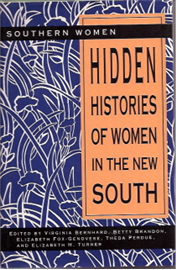 A selection of essays originally given as papers at the Second Southern Conference on Women’s History held at the University of North Carolina in June 1991. These essays reflect the diversity of southern women’s lives, documenting women in prisons and mental institutions and women activists on behalf of temperance, suffrage, birth control, and civil rights.
A selection of essays originally given as papers at the Second Southern Conference on Women’s History held at the University of North Carolina in June 1991. These essays reflect the diversity of southern women’s lives, documenting women in prisons and mental institutions and women activists on behalf of temperance, suffrage, birth control, and civil rights.
Beyond Image and Convention: Explorations in Southern Women’s History. Edited by Janet L. Coryell, Martha H. Swain, Sandra Gioia Treadway, and Elizabeth Hayes Turner. University of Missouri Press, 1998. 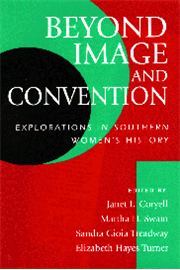 Selected essays originally given as papers at the Third Southern Conference on Women’s History held at Rice University in June 1994. The essays explore the historical experience of black and white southern women across nearly three centuries, including a white woman’s sexual misconduct in colonial North Carolina, one slave woman’s successful attempt to carve out an autonomous existence in southwestern Virginia, an ex-slave’s fight for freedom in postbellum Missouri, and the civil rights activism of two white southern women—Sarah Patton Boyle of Virginia and Alice Norwood Spearman of South Carolina.
Selected essays originally given as papers at the Third Southern Conference on Women’s History held at Rice University in June 1994. The essays explore the historical experience of black and white southern women across nearly three centuries, including a white woman’s sexual misconduct in colonial North Carolina, one slave woman’s successful attempt to carve out an autonomous existence in southwestern Virginia, an ex-slave’s fight for freedom in postbellum Missouri, and the civil rights activism of two white southern women—Sarah Patton Boyle of Virginia and Alice Norwood Spearman of South Carolina.
Taking Off the White Gloves: Southern Women and Women Historians. Edited with introduction by Michele Gillespie and Catherine Clinton. University of Missouri Press, 1998. 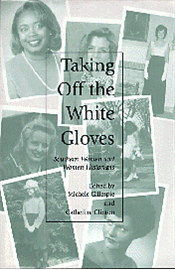 Published in anticipation of the thirtieth anniversary of the SAWH, this volume brings together some of the outstanding lectures delivered at the SAWH annual meeting by distinguished members of the association during the preceding fifteen years. Spanning four centuries of women’s experiences in the South, the topics featured range from Native American sexuality and European conquest to woman suffrage in the South, from black women’s protest history to the status of women in the historical profession at the end of the twentieth century.
Published in anticipation of the thirtieth anniversary of the SAWH, this volume brings together some of the outstanding lectures delivered at the SAWH annual meeting by distinguished members of the association during the preceding fifteen years. Spanning four centuries of women’s experiences in the South, the topics featured range from Native American sexuality and European conquest to woman suffrage in the South, from black women’s protest history to the status of women in the historical profession at the end of the twentieth century.
Negotiating the Boundaries of Southern Womanhood: Dealing With the Powers That Be. Edited by Janet L. Coryell, Thomas Appleton, Anastatia Sims, and Sandra Gioia Treadway. University of Missouri Press, 2000. 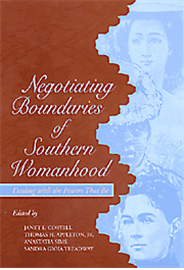
Eleven essays originally given as papers at the Fourth Southern Conference on Women’s History held at the College of Charleston in June 1997. Covering the early nineteenth through the early twentieth centuries, Negotiating Boundaries of Southern Womanhood describes the ways southern women found to advance their development and independence and establish their own identities in the context of a society that restricted their opportunities and personal freedom.
Searching for Their Places: Women in the South Across Four Centuries. Edited by Thomas H. Appleton, Jr., and Angela Boswell. University of Missouri Press, 2003. 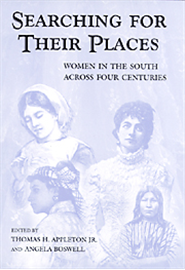 This collection of essays was inspired by the Fifth Southern Conference on Women’s History, which took place at the University of Richmond in June 2000. The essays illustrate how the national experience looks different when southern women become the focus. The essayists use extensive analyses of primary source materials to examine a variety of issues that have confronted women in the South from the days of English colonization through the civil rights struggles of the post–World War II era.
This collection of essays was inspired by the Fifth Southern Conference on Women’s History, which took place at the University of Richmond in June 2000. The essays illustrate how the national experience looks different when southern women become the focus. The essayists use extensive analyses of primary source materials to examine a variety of issues that have confronted women in the South from the days of English colonization through the civil rights struggles of the post–World War II era.
Clio’s Southern Sisters: Interviews with Leaders of the Southern Association for Women Historians. 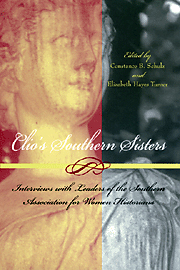 Edited by Constance L. Schulz and Elizabeth Hayes Turner. University of Missouri Press, 2004. This volume captures the stories of the women who helped to found and lead the SAWH during its first twenty years. These women bear witness to the experiences that shaped their entry into the profession. They vividly describe the point at which they and the profession shifted, leading toward a new day for women in the history profession.
Edited by Constance L. Schulz and Elizabeth Hayes Turner. University of Missouri Press, 2004. This volume captures the stories of the women who helped to found and lead the SAWH during its first twenty years. These women bear witness to the experiences that shaped their entry into the profession. They vividly describe the point at which they and the profession shifted, leading toward a new day for women in the history profession.
Women Shaping the South: Creating and Confronting Change. Edited by Angela Boswell and Judith N. McArthur. University of Missouri Press, 2006. 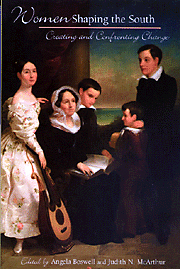 Expanded from papers presented at the Sixth Southern Conference on Women’s History that took place at the University of Georgia in June 2003, the essays in this volume demonstrate how women participated in creating change, even as they confronted conditions over which they had little power. Using new and extensive primary research, each of these authors presents a new perspective on the important roles that women of different races and classes have played in transforming the South at some of its most crucial turning points, including post-Revolution, Civil War, Jim Crow era, World War I, and the civil rights movement.
Expanded from papers presented at the Sixth Southern Conference on Women’s History that took place at the University of Georgia in June 2003, the essays in this volume demonstrate how women participated in creating change, even as they confronted conditions over which they had little power. Using new and extensive primary research, each of these authors presents a new perspective on the important roles that women of different races and classes have played in transforming the South at some of its most crucial turning points, including post-Revolution, Civil War, Jim Crow era, World War I, and the civil rights movement.
Entering the Fray: Gender, Politics, and Culture in the New South. Edited by Jonathan Daniel Wells and Sheila R. Phipps. University of Missouri Press, 2009.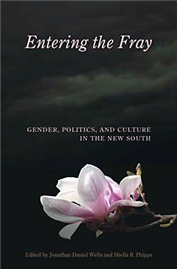 A collection of nine essays based on papers given at the Seventh Southern Conference on Women’s History held at the University of Maryland, Baltimore County, in June 2006. The essays examine the importance of gender, race, and culture in the New South, offering a rich and varied analysis of the multifaceted role of gender in the lives of black and white southerners in the troubled decades of the late nineteenth and early twentieth centuries. Ranging widely from conservative activism by white women in 1920s Georgia to political involvement by black women in 1950s Memphis, many of these essays focus on southern women’s increasing public activities and high-profile images in the twentieth century.
A collection of nine essays based on papers given at the Seventh Southern Conference on Women’s History held at the University of Maryland, Baltimore County, in June 2006. The essays examine the importance of gender, race, and culture in the New South, offering a rich and varied analysis of the multifaceted role of gender in the lives of black and white southerners in the troubled decades of the late nineteenth and early twentieth centuries. Ranging widely from conservative activism by white women in 1920s Georgia to political involvement by black women in 1950s Memphis, many of these essays focus on southern women’s increasing public activities and high-profile images in the twentieth century.
